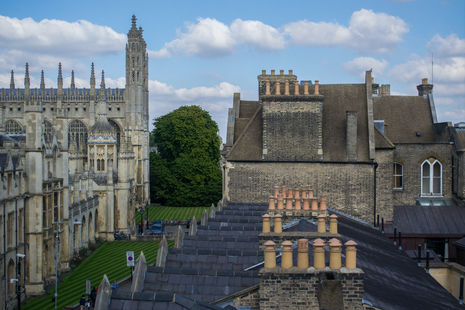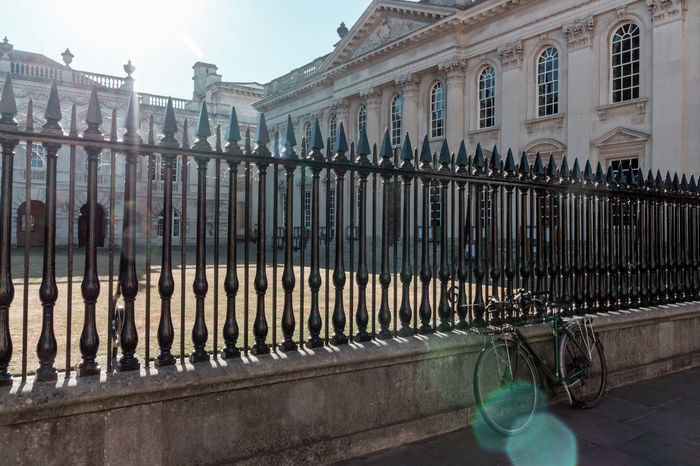Access Work: Is there a perfect solution?
Columnist Daisy Brown writes on how outreach work must adapt to the times.

Coming from a small town in South Wales, there were many myths about studying at Cambridge. When I mentioned that I was considering applying, I remember even my Mum saying it was unlikely that I’d get in - so I did originally wonder if there was any point in applying in the first place. However, what actually made me challenge these stereotypes and proceed with an application were the interactions I had with students. I had attended some Seren Network events, and an outreach event at Cambridge itself – and talking to students at Cambridge was inspiring enough for me that I decided to make my application, despite everything that I had heard previously.
As one of the access officers at my college, Trinity Hall, I’ve tried to remember how important dispelling these myths were to my own application – and the voices of Cambridge students are the key to this. Our aim is to encourage applicants from as many diverse backgrounds as possible, and I believe it is key to show potential students that they are represented in our university. Whether it be taking students on tours of the college or helping out on residentials, we really try to make sure that potential applicants are able to see students who they relate to. Our aim for access work in college is focused on awareness - by reaching out to as many schools, and students of as many backgrounds, as we can, so they have the information to apply to Cambridge in the future.
"The relative success of [online] events, despite the circumstances, has led me to question – should we have made the switch to online access work sooner?"
Traditionally, access work has been carried out on campus – through residentials, school tours and even courses with schoolteachers. However, in the wake of the coronavirus pandemic, the way that we typically approach this work has had to change. Faced with the prospect of cancellations of open days, offer holder days and masterclasses due to the coronavirus pandemic, colleges are forced to consider alternative options to the plans that have been familiar to them for years. However, many colleges, including my own, are adapting to these new circumstances by moving these events online – whether that be through Zoom, webinars, or even social media. The relative success of these events, despite the circumstances, has led me to question – should we have made the switch to online access work sooner?
In my opinion, traditional access work can often still be exclusionary for some who are unable to visit the campus. The traditional on-campus events, despite the provision of travel bursaries for some low income students, can often be unrealistic for others. Whether they are students who cannot afford the time off work to attend an event, students who have caring responsibilities being unable to travel to Cambridge, or even international students or home students living far from Cambridge who simply cannot justify the travel, traditional in-person events are very difficult to make completely accessible.
As somebody who worked through weekends, this was something that played on my mind as an applicant – was it going to be worth missing out on a couple of days’ pay and driving ten hours, there and back, to a university that I wasn’t even sure if I would like? If I had not chosen to make that journey to Cambridge, it’s far less likely that I would have applied to study here. The recent admissions data for 2019 demonstrated that applications from areas such as Scotland, Northern England and Wales had decreased – but could this have been avoided if our outreach work had been made more accessible to those unable to travel to Cambridge?
"Access work must also effect institutional changes that ensure that students from atypical Cambridge backgrounds are made completely welcome here"
In the wake of the coronavirus pandemic, many universities such as Swansea are planning to employ a dual method of teaching – both online and in person. If we conducted our outreach work in a similar way, this could potentially alleviate some of the barriers that prevent students from engaging with it. However, this is far from a perfect solution. As I am sure many have experienced with the switch to online teaching this Easter term, internet events are often unreliable. As somebody who has sat on the stairs, increasingly frustrated, in a tutor meeting trying to force my internet to connect, it makes me wonder about the 20% of people living below the poverty line in Britain, who often have no stable access to broadband. If access work is conducted online, many of these potential students simply would not have the resources to sustain contact with a university. Coupled with the fact that these students are also less likely to be able to attend on-campus events due to responsibilities such as part time jobs, this means that even if we adapt a dual format of access work, students from low socioeconomic backgrounds will continue to be excluded from outreach work.
Ultimately, it is difficult to find a “perfect” solution to improving our access work here at Cambridge. I am fully aware that although this article has only discussed access work in regard to socioeconomic background, many other barriers still exist that may discourage applicants from applying to Cambridge, as recent articles about racism against Black and non-white students have made clear- the 2019 admissions report demonstrates that applications from Black students still make up the lowest proportion of applications to Cambridge. It is not quite enough to only reach out to applicants, but access work must also effect institutional changes that ensure that students from atypical Cambridge backgrounds are made completely welcome here. Although switching to an online format has potentially alleviated some inequalities that may prevent students from engaging in access work, we still have an awfully long way to go.
 News / Cambridge academics sign open letter criticising research funding changes22 February 2026
News / Cambridge academics sign open letter criticising research funding changes22 February 2026 News / Supporters protest potential vet school closure22 February 2026
News / Supporters protest potential vet school closure22 February 2026 News / Student and union protesters hold ‘Trans Liberation Solidarity Rally’ 24 February 2026
News / Student and union protesters hold ‘Trans Liberation Solidarity Rally’ 24 February 2026 News / Union speakers condemn ‘hateful’ Katie Hopkins speech14 February 2026
News / Union speakers condemn ‘hateful’ Katie Hopkins speech14 February 2026 News / Hundreds of Cambridge academics demand vote on fate of vet course20 February 2026
News / Hundreds of Cambridge academics demand vote on fate of vet course20 February 2026










